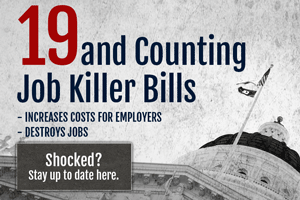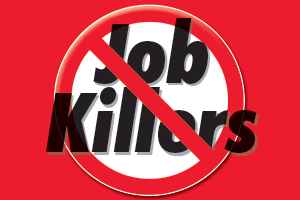 Two California Chamber of Commerce-opposed job killer bills will be considered by the Assembly Labor and Employment Committee on Wednesday.
Two California Chamber of Commerce-opposed job killer bills will be considered by the Assembly Labor and Employment Committee on Wednesday.
- AB 359 (Gonzalez; D-San Diego) inappropriately alters the employment relationship and increases frivolous litigation by requiring any successor grocery employer to retain employees of the former grocery employer for 90 days and continue to offer continued employment unless the employees’ performance during the 90-day period was unsatisfactory.
- AB 465 (Hernández; D-West Covina) significantly drives up litigation costs for all California employers as well as increases pressure on the already-overburdened judicial system by precluding mandatory employment arbitration agreements, which is likely pre-empted by the Federal Arbitration Act.
AB 359: Costly Employee Retention Mandate
AB 359 unfairly forces grocery employers to hire a predecessor’s employees, undermines the at-will employment presumption in California, and ensures continued union representation, despite any change in employers. The bill has been identified as a “job killer” because it:
- Denies employers the basic choice of whom to hire in their workforce. AB 359 mandates a successor employer retain the predecessor’s employees for no fewer than 90 days and then offer those employees continued employment unless the successor employer can identify unsatisfactory conduct during the 90-day period. Absent unlawful conduct by the employer such as discrimination or retaliation, the choice of whom an employer wants to hire and retain should be left to the employer, not the government.
- Eliminates an employer’s opportunity to investigate applicants before hiring. AB 359 basically eliminates any distinction from one employer to the next regarding the type of workforce the employer can deliver. Additionally, by limiting a subsequent employer’s ability to properly conduct background checks of potential employees, AB 359 is setting up these subsequent employers for potential negligent hiring litigation.
- Undermines the at-will presumption in order to protect the incumbent union. Because AB 359 mandates subsequent employers to hire the predecessor’s employees for at least the 90-day retention period and, thereafter, terminate such employees only for unsatisfactory performance committed during the 90-day period, it limits a successor employer’s ability to voluntarily choose its workforce, thereby triggering the successor employer doctrine. “Unsatisfactory” performance is a higher standard to achieve than the current at-will presumption of employment in California and will essentially force an employer to offer continued employment to the predecessor’s workforce, thereby ensuring recognition of the incumbent union. If a successor employer actually chooses not to offer continued employment based upon “unsatisfactory” performance, it will undoubtedly face unfair labor practice charges and civil litigation by the employee or incumbent union.
- Forces an employer to adhere to terms of a contract to which it is not a party. AB 359 mandates a successor employer to abide by these contractual provisions, even though the successor employer is not actually a party to that collective bargaining agreement. Moreover, this provision of AB 359 places a successor employer in a vulnerable position for an unfair labor practice claim between the “terms and conditions” it establishes versus the provisions of the predecessor employer’s collective bargaining agreement.
- Does not provide stability or reduce unemployment in the grocery industry. Due to the fact that AB 359 mandates that a subsequent employer must hire all of the predecessor’s employees, the subsequent employer will be forced to either: (1) displace its existing workforce to take on the new employees or (2) eliminate positions it would have opened to new applicants in the grocery industry, as those positions will be filled by the prior grocer’s employees.
- Discourages investment in grocery establishments and jeopardizes jobs. Eliminating a successor grocery employer’s ability to voluntarily choose its own workforce will ultimately discourage those employers from investing in failing grocery stores or even taking over an existing grocery establishment.
- Offers no evidence that it preserves health and safety standards. Although AB 359 states that retaining employees of a prior employer will preserve “health and safety standards” in grocery establishments, the bill makes this presumption without any evidence as to how maintaining employees of a prior grocery establishment that was failing in some manner achieves this preservation.
AB 465: Increased Litigation
AB 465 precludes pre-dispute employment arbitration agreements, which both the California Supreme Court and the U.S. Supreme Court have already authorized. As such, AB 465 will serve only to drive up litigation costs, increasing individual claims, representative actions and class action lawsuits against California employers of all sizes until such legislation can work through the judicial process to be challenged again.
The bill has been identified as a job killer because:
- California and U.S. Supreme Courts have already authorized mandatory employment arbitration agreements. AB 465 directly conflicts with these prior and recent rulings from both the California and U.S. Supreme Courts, which have consistently stated any state law that interferes with the Federal Arbitration Act is pre-empted. The time, cost and uncertainty created for all California employers while any legal challenge to AB 465 is pending in the judicial system would be detrimental to businesses and unnecessary.
- Adequate protections already exist for mandatory, pre-dispute employee arbitration agreements. The California Supreme Court has already mandated contractual provisions that must be included in a mandatory, pre-dispute arbitration employment agreement. Accordingly, adequate protections already exist in predispute, mandatory employment arbitration agreements.
- Arbitration provides an effective and efficient means to resolve employment-related claims. According to the U.S. District Court Judicial Caseload Profiler, there were 29,312 civil cases filed in California in 2014. As of June 2014, approximately 2,132 cases had been pending in federal court in California for more than three years and the median time from filing of a civil complaint to trial in Northern California was 31 months. A report published by the Heritage Foundation in July 2013, “The Unfair Attack on Arbitration: Harming Consumers by Eliminating a Proven Dispute Resolution System,” concludes that “[a]rbitration is generally faster, cheaper, and more effective than the litigation system. It is not affected by cutbacks in judicial budgets or the increases in court dockets that significantly delay justice.”
- AB 465 will send disputes into the overburdened and underfunded judicial system. AB 465 will force more employment disputes into the already-overburdened judicial system, thereby delaying any recovery of potential wages for an employee even longer by essentially banning any predispute, mandatory employment arbitration agreements.
- AB 465 will create a worse litigation environment and lack of job creation. California’s economic recovery depends on its ability to create an environment where job creation can flourish. AB 465 will neither help California’s litigation environment nor promote businesses’ ability to create jobs as it will drive up California employers’ litigation costs.
Staff Contact: Jennifer Barrera


